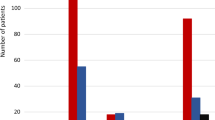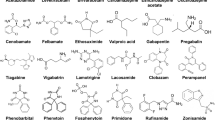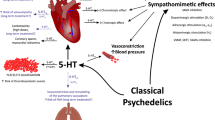Abstract
Depot antipsychotics have been used as a strategy to reduce non-adherence to medications in schizophrenia and bipolar disorder (BD). This article reviews the literature on the efficacy and safety of first- and second-generation depot antipsychotics (FGDA and SGDA, respectively) for the maintenance treatment of BD. Although FGDA have been studied in BD, they have not been approved for use in this disease. Among the SGDA, only depot risperidone has been studied and approved for the maintenance treatment of BD. We found eight studies on FGDA (three on flupenthixol, two on depot halo-peridol, one on fluphenazine and flupenthixol, two on a mix of diverse antipsychotics) and ten studies on SGDA (all on depot risperidone). Differences in efficacy and safety were found between the two classes of depot antipsychotics. Although FGDA may be effective in reducing manic relapses, they possibly increase the risk of worsening depression. Depot risperidone is effective as a maintenance treatment in BD with effect noted predominantly for preventing mania. However, no worsening in depression was observed. Depot risperidone also is better tolerated than FGDA, mainly in relation to extrapyramidal symptoms. Studies with the new depot antipsychotics, olanzapine pamoate and paliperidone palmitate, are needed in BD patients. Further, there is currently little information on the metabolic changes (apart from bodyweight gain) that may occur with the use of depot risperidone in patients with bipolar disorder, and this issue needs further investigation.



Similar content being viewed by others
References
Merikangas K, Akiskal H, Angst J, et al. Lifetime and 12-month prevalence of bipolar spectrum disorder in the National Comorbidity Survey replication. Arch Gen Psychiatry 2007; 64(5): 543–52
Tohen M, Hennen J, Zarate CJ, et al. Two-year syndromal and functional recovery in 219 cases of first-episode major affective disorder with psychotic features. Am J Psychiatry 2000; 157(2): 220–8
MacQueen G, Young L, Joffe R. A review of psychosocial outcome in patients with bipolar disorder. Acta Psychiatr Scand 2001; 103(3): 163–70
Torres IJ, Boudreau VG, Yatham LN. Neuropsychological functioning in euthymic bipolar disorder: a meta-analysis. Acta Psychiatr Scand Suppl 2007; (434): 17-26
Kauer-Sant’Anna M, Bond DJ, Lam RW, et al. Functional outcomes in first-episode patients with bipolar disorder: a prospective study from the Systematic Treatment Optimization Program for Early Mania project. Compr Psychiatry 2009 Jan–Feb; 50(1): 1–8
Rosa A, Reinares M, Michalak E, et al. Functional impairment and disability across mood states in bipolar disorder. Value Health 2010 Dec; 13(8): 984–8
Miklowitz DJ. Functional impairment, stress, and psycho-social intervention in bipolar disorder. Curr Psychiatry Rep 2011 Dec; 13(6): 504–12
Rosa AR, Reinares M, Franco C, et al. Clinical predictors of functional outcome of bipolar patients in remission. Bipolar Disord 2009; 11(4): 401–9
López-Jaramillo C, Lopera-Vásquez J, Gallo A, et al. Effects of recurrence on the cognitive performance of patients with bipolar I disorder: implications for relapse prevention and treatment adherence. Bipolar Disord 2010 Aug; 12(5): 557–67
Hong J, Reed C, Novick D, et al. Clinical and economic consequences of medication non-adherence in the treatment of patients with a manic/mixed episode of bipolar disorder: results from the European Mania in Bipolar Longitudinal Evaluation of Medication (EMBLEM) study. Psychiatry Res 2011; 190(1): 110–4
Lingam R, Scott J. Treatment non-adherence in affective disorders. Acta Psychiatr Scand 2002 Mar; 105(3): 164–72
Bates JA, Whitehead R, Bolge SC, et al. Correlates of medication adherence among patients with bipolar disorder: results of the Bipolar Evaluation of Satisfaction and Tolerability (BEST) study: a nationwide cross-sectional survey. Prim Care Companion J Clin Psychiatry 2010; 12(5): PCC.09m00883
González-Pinto A, Reed C, Novick D, et al. Assessment of medication adherence in a cohort of patients with bipolar disorder. Pharmacopsychiatry 2010 Nov; 43(7): 263–70
Suppes T, Baldessarini RJ, Faedda GL, et al. Risk of recurrence following discontinuation of lithium treatment in bipolar disorder. Arch Gen Psychiatry 1991 Dec; 48(12): 1082–8
Müller-Oerlinghausen B, Müser-Causemann B, Volk J. Suicides and parasuicides in a high-risk patient group on and off lithium long-term medication. J Affect Disord 1992 Aug; 25(4): 261–9
Scott J, Pope M. Self-reported adherence to treatment with mood stabilizers, plasma levels, and psychiatric hospitalization. Am J Psychiatry 2002 Nov; 159(11): 1927–9
Cavanagh J, Smyth R, Goodwin GM. Relapse into mania or depression following lithium discontinuation: a 7-year follow-up. Acta Psychiatr Scand 2004 Feb; 109(2): 91–5
Angst J, Angst F, Gerber-Werder R, et al. Suicide in 2005; 9(3): 279–300
Gonzalez-Pinto A, Mosquera F, Alonso M, et al. Suicidal risk in bipolar I disorder patients and adherence to long-term lithium treatment. Bipolar Disord 2006 Oct; 8 (5 Pt 2): 618–24
Perlis RH, Ostacher MJ, Miklowitz DJ, et al. Clinical features associated with poor pharmacologic adherence in bipolar disorder: results from the STEP-BD study. J Clin Ps406 mood-disorder patients with and without long-term medication: a 40 to 44 years’ follow-up. Arch Suicide Res Psychiatry 2010 Mar; 71(3): 296–303
Taylor D. Psychopharmacology and adverse effects of antipsychotic long-acting injections: a review. Br J Psychiatry Suppl 2009 Nov; 52: S13–9
Haddad PM, Taylor M, Niaz OS. First-generation anti-psychotic long-acting injections v. oral antipsychotics in schizophrenia: systematic review of randomised controlled trials and observational studies. Br J Psychiatry Suppl 2009 Nov; 52: S20–8
Leucht C, Heres S, Kane JM, et al. Oral versus depot anti-psychotic drugs for schizophrenia: a critical systematic review and meta-analysis of randomised long-term trials. Schizophr Res 2011 Apr; 127(1–3): 83–92
Brnabic AJ, Kelin K, Ascher-Svanum H, et al. Medication discontinuation with depot and oral antipsychotics in outpatients with schizophrenia: comparison of matched cohorts from a 12-month observational study. Int J Clin Pract 2011 Sep; 65(9): 945–53
Kane JM. Utilization of long-acting antipsychotic medication in patient care. CNS Spectr 2006 Dec; 11(12 Suppl. 14): 1–7
McEvoy JP. Risks versus benefits of different types of long-acting injectable antipsychotics. J Clin Psychiatry 2006; 67 Suppl. 5: 15–8
Naylor GJ, Scott CR. Depot injections for affective disorders. Br J Psychiatry 1980 Jan; 136: 105
Ahlfors UG, Baastrup PC, Dencker SJ, et al. Flupenthixol decanoate in recurrent manic-depressive illness: a comparison with lithium. Acta Psychiatr Scand 1981 Sep; 64(3): 226–37
Lowe MR. Treatment of rapid cycling affective illness. Br J Psychiatry 1985 May; 146: 558
Lowe MR, Batchelor DH. Depot neuroleptics and manic depressive psychosis. Int Clin Psychopharmacol 1986 Jul; 1 Suppl. 1: 53–62
Esparon J, Kolloori J, Naylor GJ, et al. Comparison of the prophylactic action of flupenthixol with placebo in lithium treated manic-depressive patients. Br J Psychiatry 1986 Jun; 148: 723–5
White E, Cheung P, Silverstone T. Depot antipsychotics in bipolar affective disorder. Int Clin Psychopharmacol 1993; 8(2): 119–22
Littlejohn R, Leslie F, Cookson J. Depot antipsychotics in the prophylaxis of bipolar affective disorder. Br J Psychiatry 1994 Dec; 165(6): 827–9
Savas HA, Yumru M, Ozen ME. Use of long-acting risperidone in the treatment of bipolar patients. J Clin Psycho-pharmacol 2006 Oct; 26(5): 530–1
Han C, Lee MS, Pae CU, et al. Usefulness of long-acting injectable risperidone during 12-month maintenance therapy of bipolar disorder. Prog Neuropsychopharmacol Biol Psychiatry 2007 Aug; 31(6): 1219–23
Yatham LN, Fallu A, Binder CE. A 6-month randomized open-label comparison of continuation of oral atypical antipsychotic therapy or switch to long acting injectable risperidone in patients with bipolar disorder. Acta Psychiatr Scand Suppl 2007; (434): 50-6
Malempati RN, Bond DJ, Yatham LN. Depot risperidone in the outpatient management of bipolar disorder: a 2-year study of 10 patients. Int Clin Psychopharmacol 2008 Mar; 23(2): 88–94
Braunig P, Sacchetti E, Medori R. Risperidone long-acting injectable for maintenance therapy in bipolar disorder: an open-label pilot study. Int J Psychiatr Clin Pract 2008; 12(1): 74–7
Benabarre A, Castro P, Sánchez-Moreno J, et al. Efficacy and safety of long-acting injectable risperidone in maintenance phase of bipolar and schizoaffective disorder. Actas Esp Psiquiatr 2009 May–Jun; 37(3): 143–7
Vieta E, Nieto E, Autet A, et al. A long-term prospective study on the outcome of bipolar patients treated with long-acting injectable risperidone. World J Biol Psychiatry 2008; 9(3): 219–24
Fu-I L, Boarati MA, Stravogiannis A, et al. Use of risperidone long-acting injection to support treatment adherence and mood stabilization in pediatric bipolar patients: a case series. J Clin Psychiatry 2009 Apr; 70(4): 604–6
Macfadden W, Alphs L, Haskins JT, et al. A randomized, double-blind, placebo-controlled study of maintenance treatment with adjunctive risperidone long-acting therapy in patients with bipolar I disorder who relapse frequently. Bipolar Disord 2009 Dec; 11(8): 827–39
Quiroz JA, Yatham LN, Palumbo JM, et al. Risperidone long-acting injectable monotherapy in the maintenance treatment ofbipolar I disorder. Biol Psychiatry 2010 Jul 15; 68(2): 156–62
Acknowledgements
No sources of funding were received to prepare this article. Lakshmi Yatham has been a speaker, member of ad hoc advisory boards and received grant funding from Astrazeneca, Janssen, Lilly, Bristol Myers Squibb, Pfizer, GSK, Merck, Lundbeck, Servier and Forest. The other authors have no conflicts of interest that are directly relevant to the content of this article.
Author information
Authors and Affiliations
Corresponding author
Rights and permissions
About this article
Cite this article
Gigante, A.D., Lafer, B. & Yatham, L.N. Long-Acting Injectable Antipsychotics for the Maintenance Treatment of Bipolar Disorder. CNS Drugs 26, 403–420 (2012). https://doi.org/10.2165/11631310-000000000-00000
Published:
Issue Date:
DOI: https://doi.org/10.2165/11631310-000000000-00000




